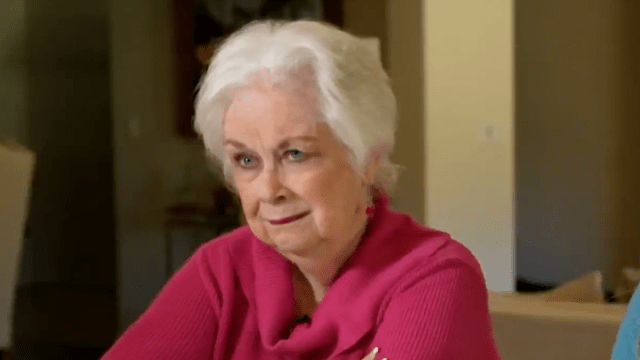Grandma Reveals How She Lost $150,000 to Wells Fargo Scam—And How She Got It Back

While anyone can be vulnerable to financial scams, the data doesn’t lie: Elderly Americans are the biggest targets. In 2022, more than 80,000 adults over the age of 60 were victims of financial fraud, according to the Federal Bureau of Investigation’s (FBI) 2022 Elder Fraud Report. Victims lost a reported total of $3.1 billion—an 84 percent increase from 2021.
RELATED: Woman Loses $33,000 to Bank Scam—Here Are the Red Flags She Missed.
Wells Fargo’s online security center warns that sweepstakes scams, romance scams, and tech support impersonators are some of the most common types of fraud among seniors. But Southern California resident and Wells Fargo customer Judith Anderson is warning others of another kind of scam that resulted in her losing nearly $150,000 in less than an hour.
In the days leading up to Christmas, Anderson received an incoming call from a spoofed number under the guise of Wells Fargo’s Fraud Division. The scammer told her a person in Texas had compromised her account and she was at jeopardy of losing her money if she didn’t act quickly.
“They said there was somebody charging multiple charges in Texas, and I said, ‘That’s not me’,” Anderson recalled in an interview with NBC 7. “He said, ‘We need to stop this person from doing this, and to do that, we will have you wire money to yourself.’”
The bad actor instilled fear in Anderson, along with a sense of urgency, a common tactic of scammers. Against her better judgment, she followed along with their instructions.
Anderson was coached into changing her password. Meanwhile, the scammer was adding digital wire services to her account. They also tricked her into forwarding any incoming calls to prevent a possible interruption from their phone call.
As she told NBC 7, she was then instructed to wire $49,000 to a receipts account that he had given the name of “Judith Anderson.” Anderson didn’t realize that her name was being used as a nickname for an account that was actually under the name Wendell Henry.
“My name was on there,” Anderson said, noting she never saw a “Wendell Henry” linked to the receipts account. “I clicked on the name Judith Anderson, and I sent the wire, and there was another one.”
RELATED: If You Get a Phone Call From One of These 12 Numbers, It’s a Scam.
After the initial transfer, Anderson said she was instructed to wire an additional $49,000, and then another $49,000. With each transfer, Anderson was pressured to act faster out to protect her account.
“He kept telling me, ‘OK, you got one minute, one minute left to do this,’” Anderson recalled to NBC 7.
Behind the scenes, the scammer had set up a second account receipt with the name Angel Rivera, which is where Anderson’s third money transfer was deposited. In the middle of sending the fourth transfer, Anderson developed a bad feeling in her gut. Suspicious, she hung up and called her daughter for help.
“I called Tracy and I said, ‘I’m scared’,” she said.
Upon answering her mother’s phone call, Tracy Martinez said she knew her mom had been financially taken advantage of.
“’You’re getting scammed; I’m on my way over,'” Martinez told her frightened mom. “I said, ‘You hang up with me right now and call Wells Fargo directly.’”
Anderson got in contact with a Wells Fargo representative, who was able to put a stop to the fourth transfer. Speaking to NBC 7, Martinez said the bank should have notified her mom of “abnormal behavior” occurring in her account after the first transfer.
“After the first one, you know, wouldn’t there be something internally of, ‘That doesn’t look right’?” Martinez said. “She’s banked there 52 years and that’s abnormal behavior.”
RELATED: 6 Subtle Signs You’re the Victim of Bank Fraud, According to Experts.
While Anderson was able to take possession of the fourth $49,000 transfer, she was still out almost $150,000. Martinez immediately took action, making noise on social media and alerting local news stations of the situation.
She also got in touch with someone at Wells Fargo, who rejected her claims despite the timeline of events Martinez shared. When NBC 7 reached out to Wells Fargo for comment, the bank shared a blanket statement about scams being “an industry-wide concern” and noted that it’s important “to raise awareness of common scams.”
Following the publication of NBC 7’s story, however, Martinez was notified that Wells Fargo had “decided to reverse the decision” and was able to recover Anderson’s $147,000.
“My son and my daughter, we got on Facetime and they said, ‘You have your money back,’ and I was just overwhelmed,” Anderson said in an update with NBC 7.
Meanwhile, NBC 7 received the following statement from Wells Fargo about Anderson’s case: “We are pleased we were able to resolve this issue for our customer. While we cannot provide details on this case for privacy and confidentiality reasons, we can share that we conducted a thorough review and completed our investigation after receiving additional information.”
Ultimately, the bank didn’t explain why they decided to reverse their decision, but the attention Anderson and her daughter drew to her case likely helped, along with the thorough timeline they provided. Either way, Anderson said Wells Fargo’s decision was a huge weight off her shoulders.
“I was so thankful for all the prayers and all the well-wishes, for you putting it out there, and hopefully protecting someone else from going through this,” she told NBC 7.
- Source: FBI: Elder Fraud Report 2022